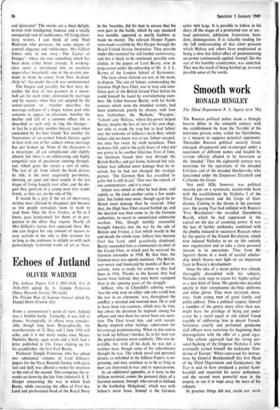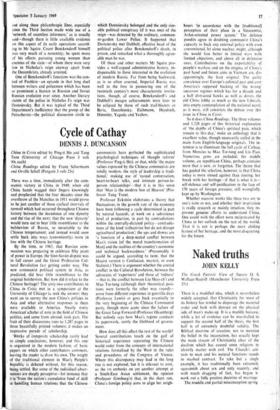The Third Department P. S. Squire (cur 70s)
Smooth work
RONALD HINGLEY
The Russian political police made a fittingly bizarre debut in the sixteenth century with the establishment by Ivan the Terrible of his notorious private army, called the Oprichnina, as a weapon to suppress potential opponents. Thereafter. Russian political security forces emerged, disappeared and re-emerged under a succession of different names and headed by various officials alluded to by historians as the 'dreaded.' Thus the eighteenth century was notorious for the operations of the dreaded Ushakov and of the dreaded Sheshkovsky who functioned under the Empresses Elizabeth and Catherine the Great.
Not until 1826, however, was political security put on a systematic, nation-wide basis with the -establishment by Nicholas I of the. Third. Department and the Corps of Gen- darmes. Coming to the throne in the previous year, the young Tsar had collided with Russia's 'First Revolution'---the so-called Decembrist--.--, Revolt, which he had suppressed in the capital on the day of assuming power. It was the fear of further outbreaks, combined with the phobia induced in successive Russian rulers by the spectre of the French Revolution, which now induced Nicholas to set up this entirely new organisation and to take a close personal interest in its operations. They form Mr Squire's theme in a. work of careful scholar- ship which throws new light on an important facet in Russia's development.
Since the idea of a secret police was already thoroughly discredited with his subjects, Nicholas took steps to create his 'higher police' as a new kind of force. His gendarmes paraded openly in their conspicuous sky-blue uniforms and white gloves. They were recruited, more- over, from young men of good family and polite address. Thus a political suspect, himself a member of the gentry more often than not, might have the privilege of being put under arrest by a social equal or old school 'friend capable of addressing him in decent French. Solicitous, courtly and perfumed, gendarme staff officers were notorious for beginning their interrogations with the offer of a good cigar.
This urbane approach had the strong per- sonal backing of the Emperor Nicholas I, who eventually earned himself the nickname 'Gen- dal-me of Europe.' When canvassed for instruc- tions by General Benckendorff (his first Head of the Third Department and Gendarmes), the Tsar is said to have produced a pocket hand- kerchief and requested his senior policeman, and the second most powerful man in the empire, to use it to wipe away the tears of his subjects.
In practice things did not, could not. work out along these philanthropic lines, especially since the Third Section made wide use of a 'network of countless informers,' as is usually said—though there is little available evidence on this aspect of its early operations accord- ing to Mr Squire. Count Benckendorff himself was very much of a nonentity; he spent more of his efforts pursuing young women than enemies of the state—of whom there were very few in Nicholas's reign anyway apart from the Decembrists, already arrested.
One of Benckendorff's functions was the con- trol of Pushkin—an episode in that long duel between writers and policemen which has been so prominent a feature in Russian and Soviet Russian evolution ever since. Another literary victim of the police in Nicholas l's reign was Dostoievsky. But it was typical of the Third Department's inefficiency that the group of the Petrashevtsi—the political discussion circle to
which Dostoievsky belonged and the only size- able political conspiracy (if it was one) of the reign—was detected by the ordinary, common- or-garden Lower Police. It happened that Dostoievsky met Dubbelt, effective head of the political police after Benckendorff's death, in prison, and remarked what a thoroughly agree- able man he was.
Of these and other matters Mr Squire pro- vides a well-argued administrative history, in- dispensable to those interested in the evolution of modern Russia. Far from being backward, as is so often asserted, Imperial Russia was well to the fore in pioneering one of the twentieth century's most characteristic institu- tions, though, of course, Benckendorff's and Dubbelt's meagre achievements were later to be eclipsed by those of such trail-blazers as Beria, Dzerzhinsky, Eichmann, Heydrich, Himmler, Yagoda and Yezhov.



































 Previous page
Previous page